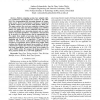Free Online Productivity Tools
i2Speak
i2Symbol
i2OCR
iTex2Img
iWeb2Print
iWeb2Shot
i2Type
iPdf2Split
iPdf2Merge
i2Bopomofo
i2Arabic
i2Style
i2Image
i2PDF
iLatex2Rtf
Sci2ools
135
Voted
RTAS
2010
IEEE
2010
IEEE
Timing Analysis for TDMA Arbitration in Resource Sharing Systems
Abstract--Modern computing systems have adopted multicore architectures and multiprocessor systems on chip (MPSoCs) for accommodating the increasing demand on computation power. However, performance boosting is constrained by shared resources, such as buses, main memory, DMA, etc. This paper analyzes the worst-case completion (response) time for real-time tasks when time division multiple access (TDMA) policies are applied for resource arbitration. Real-time tasks execute periodically on a processing element and are constituted by sequential superblocks. A superblock is characterized by its accesses to a shared resource and its computation time. We explore three models of accessing shared resources: (1) dedicated access model, in which accesses happen only at the beginning and the end of a superblock, (2) general access model, in which accesses could happen anytime during the execution of a superblock, and (3) hybrid access model, which combines the dedicated and general access models....
Related Content
| Added | 14 Feb 2011 |
| Updated | 14 Feb 2011 |
| Type | Journal |
| Year | 2010 |
| Where | RTAS |
| Authors | Andreas Schranzhofer, Jian-Jia Chen, Lothar Thiele |
Comments (0)

